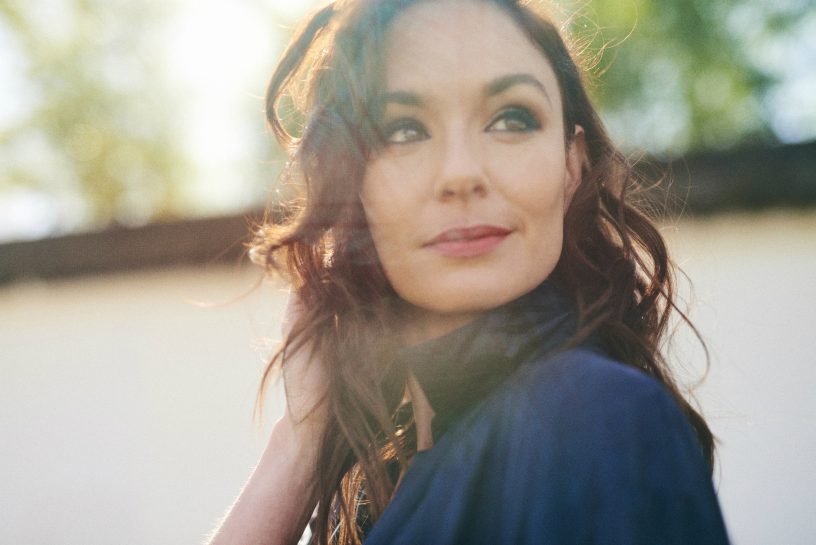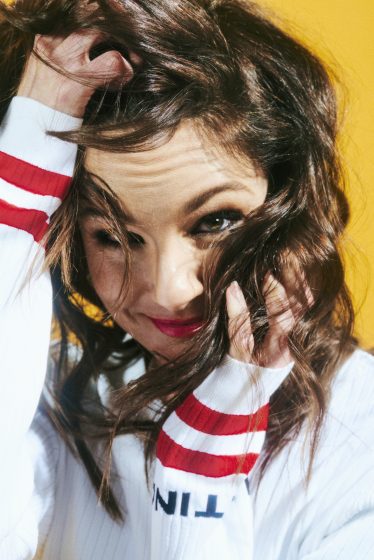When she is being nobody but herself, Sarah Wayne Callies is very likeable. She’s funny, friendly, passionate, and talkative. On the television screen, though, it’s another story entirely.
The characters Callies tends to play are irrepressibly flawed and sometimes downright unlikable. And interestingly, she wants it that way.
Seated on a couch inside Remington Gallery and Studio on East Hastings, Callies explains that after playing the adored Sara Tancredi on Fox’s Prison Break, she was looking for a more difficult and controversial character. That’s how she came to portray the overwhelmingly ostracized Lori Grimes on the hit AMC zombie show The Walking Dead.

“The reason that I was looking for a role like Lori coming off of Prison Break was because that character [of Sara] was so beloved and embraced and supported by fans,” she says. “It was moving and incredible, but I thought, ‘If I’m not careful, I’ll get addicted to this. And then I’m going to be making choices so that the audience likes me. And then I’m not serving the story, I’m serving myself, and that’s not by job.’ So I found intentionally a very contentious character who was occupying a space that made a lot of people uncomfortable.” Callies mentions Lori’s exploration of sexuality and motherhood as being enough “to drive some people out of the room”—ultimately, she’s a character with her own beliefs, not created to simply serve the plot line of her heroic husband Rick (played by Andrew Lincoln). And that alone made her radical.
Even on Colony, USA Network’s post-apocalyptic drama set in occupied Los Angeles, Callies plays the deeply conflicted and sometimes frustrating Katie Bowman—a brave woman who, after her son goes missing, joins a risky underground resistance. “If you have a show full of likeable characters, you have no show,” Callies asserts. “I think it’s dangerous. I think actors on television can really fall into a trap of wanting an audience to like them. I’ve seen actors fight a script so hard because they want to be a quote-unquote hero. But I think audiences are sophisticated enough to understand that heroes are flawed and people make mistakes, and what makes you heroic to the extent that that’s something even worth pursuing is overcoming those flaws and learning from those mistakes.”
“If you just sort of show up with a halo, so what? Okay, you’re good, but I can’t learn anything from you and I can’t relate to you.”
Regardless of the role, what Callies brings to the screen is a delicate earnestness and a complex mix of vulnerability and strength. Indeed, the description of her characters as “strong women” seems to trail Callies through her career. “On the one hand, I feel like nobody ever asked Bruce Willis why he played so many strong characters,” she says. “I understand it, because so many of the characters that women are asked to play are submissive or passive or only exist to serve the male storyline. But I’ve been asked the question so many times that I wonder if they started out that strong when they were written, or if they just ended up that way because I was playing them. I don’t know. It’s certainly not the only kind of thing I audition for, but it seems to be what I get. And that might be because I’m not real good at the sort of wallflower, stand by your man, ‘I have no personal needs’ kind of thing. That said, I may end up doing some play in six months, playing a sweet little submissive housekeeper. I have no idea.” Either way, she acknowledges that roles like Colony’s Katie didn’t exist when she began her acting career in the early 2000s after graduating from Denver’s National Theater Conservatory with a master’s in fine arts.
Callies is from Hawaii, a place she calls “only marginally American,” and moved to British Columbia with her husband 12 years ago. Falling in love with the province’s natural beauty and laid-back attitude after Callies filmed 2003’s Tarzan series in Vancouver, the couple decided this was the place where they wanted to raise their kids. Back then, television was only on the cusp of becoming what it is today: one of the most influential and exciting forms of storytelling.

“I think importantly it’s become one of the mediums in entertainment that is the most supportive and friendly to women,” Callies shares. “It’s not an accident that as a woman starting to direct, I started to direct in television because for the first time in my career, in the last year and a half, they’re actually looking for us, instead of trying to look away from us and pretend that we’re not there.” Her directing debut comes with an episode in the third season of Colony, which premieres on May 2, 2018 (she is also currently directing a new miniseries, CBC’s Unspeakable, that she stars in as well). “It was almost spiritually profound,” she says of directing Colony, and admits the relief she felt when “nobody called me and said, ‘We’re going to re-shoot this entire episode.’” She lets out a laugh at the memory, equal parts self-deprecating and genuine relief.
Ultimately this in-between is where Callies finds her sweet spot. She is sure of herself and is unapologetic about it—but she is also incredibly grounded (perhaps partly thanks to her love of meditation), taking solace in rugged nature walks on Vancouver Island and asking to apply her own mascara even when a professional artist is doing her makeup. She laughs loud, smiles big, and speaks with intention. She is a strong woman, though what that means is for her to decide.
Read more from the Arts.











